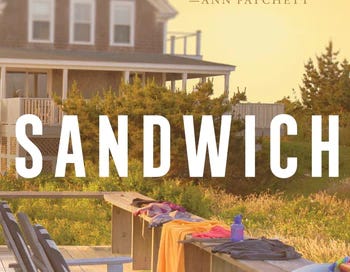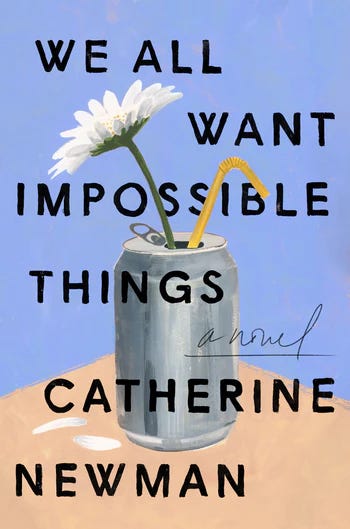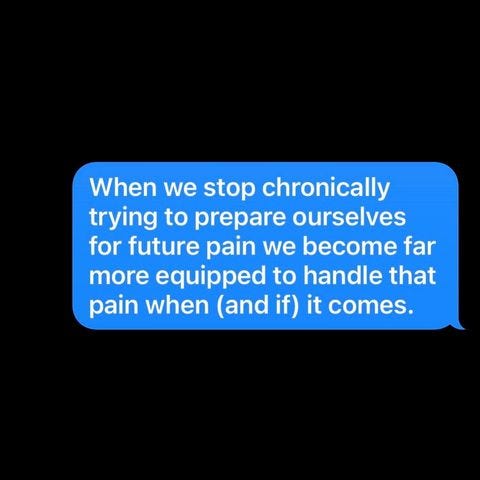☀️ Field Notes: August 2024 ☀️
Two book recommendations, tips around accidental peeing, risk factors for dementia, how we are actually always loving ourselves, a poem, and more
Hello, dear friends,
It’s time for a monthly sharing of links around illness, wellness, and how we swim through these spells of life. I added in books this time! I’m always on the lookout for good reads, so feel free to drop recommendations for all of us in the comments.
What have you absorbed in August that you loved, that helped, or that made you think?
To our journeys,
Brianne
📷 Six summer-themed photographs about ME/CFS by Andrew Gifford
View this ongoing exploration of living with ME/CFS (myalgic encephalomyelitis/chronic fatigue syndrome), simple, arresting images by
that convey an incredible depth of human experience. The words that accompany them are an intimate portal into a life up-ended by this mysterious, underfunded disease that affects millions.Books by Catherine Newman
I flew through Sandwich during our family beach week, which was fitting, because the novel follows the annual week at the beach for a different family, this one with mom “Rocky” (Rachel), dad Nick, two 20-something kids and one girlfriend, plus Rocky’s parents who drop in, too. (Sandwich likely refers to both Sandwich, Mass., a Cape Cod town, and the sandwich generation.)
Like Ann Patchett or Anne Taylor,
has an exquisite way of capturing the little moments and ups and downs in family life. Her families are quirky and funny and sweet to each other, but there are, of course, still bumps — discoveries, grumpiness, guilt, illness, all the things. I want to give you warning for those of you who might be tender around some topics but also don’t want to give anything away. Let’s say that there are themes around love and loss, pregnancy and menopause, change and growing older.I do adore her families and their kindness to each other.
One more book from Catherine Newman — I read We All Want Impossible Things a few years ago, and I loved it more than Sandwich. It centers on a two friends, one of whom is dying of cancer, and one who is caring for her in the final stage. You would think it might be morbid or depressing, but they — like any two women who dear friends — manage to be ridiculously funny, silly, and wise, a sprawling range of human life that made my heart swell. If we had an Odyssey of the Body book club, this would be on the list.
💧 Let’s Talk About Urination by Dr. Lucy McBride
This is a hilarious — and practical — look at bladder function, after
hung out with friends over the weekend and the topic kept coming up.“I just wet my pants,” I jumped up and quickly alerted the group after letting out a loud guffaw. “Oh! I was up all night in the bathroom!” another friend replied. It turns out she’d had to pee four times in the night. Our other friend wondered aloud whether her bladder had shrunk during menopause. Our fourth friend took matters one step further, reporting the dual disruption of fecal and urinary leakage whenever she jogs midday.”
Dr. McBride shares her tips:
Limit your intake of caffeine
Drink more water in the daytime and fewer liquids before bedtime
Manage constipation
For men: check your prostate
For women: consider HRT (local or systemic)
Use it or lose it (work your pelvic floor muscles)
She explains the details in the full post.
💗 Why Self-Love Is So Hard to Achieve by poet Andrea Gibsen
I love
’s reflections here on loving ourselves:“The first time I experienced this love I was shook by a realization—I had never not loved myself. I only thought I hadn’t. By that I mean, this love is always ringing through the essence of every being. It is the same love the squirrel experiences, the aspens, the bioluminescence in the sea. Not loving ourselves, I’ve come to know, is a very human concept. We don’t have to strive or achieve something to love ourselves, we only have to strip the thought that we should not love ourselves away, to see that we have been loving ourselves all along.”
Read the full post.
Andrea also writes texts to themselves, which are included at the bottom of the post and on Instagram. Here’s one such self-text:
🦻👓Dementia prevention, intervention, and care in the 2024 Lancet Commission Report
This free report (you do need to register) is a summary of new research from the Lancet Commission on Dementia:
“The potential for prevention is high and, overall, nearly half of dementias could theoretically be prevented by eliminating these 14 risk factors. These findings provide hope.”
Two risk factors that stood out to me were untreated hearing loss and untreated vision loss: “Use of hearing aids appears to be particularly effective in people with hearing loss and additional risk factors for dementia.”
Read the full report.
👐 On Getting Help by Molly Knight
Sports writer
shares what she has done to manage her anxiety and depression with lots of care, wisdom, and practical suggestions.“Depression is like cancer in that there is one name, but that name encompasses infinity different varieties that respond to infinity different treatments. I’ve gotten help over the years. My condition is currently in remission, but I monitor it every day like a diabetic watches her blood sugar. When I’m at my lowest, the thing I do most is google other stories of people who have been through horrible depression and anxiety and how they got better. I hope this post will be a place people can land and come away believing there is help and there is hope.”
Read the full post.
The Pain of Others, a poem by Hannah Aizenman
A musing by on the unknowable-ness of how others feel, with a zing of an ending.
Here’s how it begins:
On the radio, I hear a doctor describe
his dilemma: the inalienability
of pain, of sensation altogether.The body almost a black box,
for all its symptoms and signs, the being-
in-it like marooned on an island, relianton shapes of smoke reaching, legible,
some passing ship. ….
Read the full poem by Hannah Aizenman.
Rethinking how we support others through grief by Ruhie Vaidya
How can we support friends or family members who are grieving?
reflects on the misguided tropes she received after losing her father and assembles a list of better guidance. Here’s one:DON’T: Advise them to “be strong”
DO: Let them know it’s okay to cry, and see their tears as proof of emotional strength, not fragility – a testament to the depth of their relationship with the person they lost.
Lastly: From the Odyssey of the Body archives
I hope you found something useful, illuminating, comforting here. And I hope you have a sweet day ahead. It’s nearly September, and a new season will be upon us soon!
To our journeys,
Brianne








Thank you for the mention Brianne! It's lovely to hear you found this piece useful. I love this list of tid bits you've put together. Excited to peruse through them and to connect with you here :)
Good stuff, Brianne! I had to get on vaginal estrogen and start doing Pilates to help my accidental peeing. No one ever taught us that perimenopause would affect our pee hole or function! Lol.